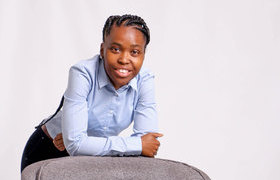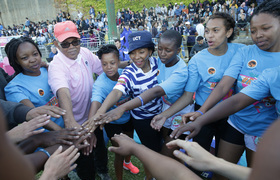Thandiswa Nxomani’s inspiring rise in women’s rugby
26 August 2025 | Story Myolisi Gophe. Photo Supplied. Voice Cwenga Koyana. Read time 9 min.
When Thandiswa Nxomani volunteered to manage the African Bombers amateur rugby club, it was by chance, as the club didn’t have a manager. Little did she know that the decision would not only ignite a new passion in her but would also put her on a path to rise through the rugby ranks in South Africa to become the Springbok Women’s team manager.
“I just realised I loved being in that space, making sure the players had what they needed, and keeping things running smoothly,” she said.
And when Nxomani, who is pursuing a postgraduate diploma in sport management at the University of Cape Town (UCT), boarded her flight to England earlier this month, she wasn’t just travelling to another tournament. She was heading to the biggest stage in women’s rugby – the World Cup – as the team manager of Springbok Women. For the 36-year-old from Peddie in the Eastern Cape, who once dabbled with playing rugby before finding her true calling in administration, it was a full-circle moment in a career built on passion and purpose.
“I love the players. I love the people I work with. That’s what keeps me going,” Nxomani said from camp in Northampton, where the Springbok Women are preparing to face the likes of Brazil, Italy and France in their Pool D matches.
Journey
Her rugby journey wasn’t straightforward. After high school, Nxomani studied at Nelson Mandela Metropolitan University and later joined the Department of Sport in her province. It was a friend who was a Springbok player at the time who first nudged her towards rugby. “She kept saying, ‘Try it out, try it out,’” Nxomani recalled. “I did, but it wasn’t for me. By then, I was in my early twenties, already carrying sports injuries. So, I decided to step away from playing.”
Instead, she found herself managing African Bombers, a club side in the Eastern Cape, which produced, among others, Springboks Captain Siya Kolisi. Nxomani recalled that the team didn’t have a manager, and that’s when she stepped in, volunteering.
That decision set her on a trajectory that would eventually take her to SA Rugby. First came a position with Eastern Province Rugby’s women’s department, then an opportunity to manage the junior Springbok Women’s under-20 team. By 2022, she was managing the national Springbok Women’s Sevens side, accompanying them to the World Cup and Commonwealth Games. In 2023, after the 15s World Cup in New Zealand, she moved across to the Springbok Women’s 15s team, a role she holds today.
Behind the scenes of a high-pressure job
Being a team manager might not come with the glory of scoring tries, but it’s the backbone of international rugby. From securing visas to ensuring the right kit is packed for training, Nxomani’s day is a masterclass in organisation.
“But most of the work happens long before we arrive at a tournament,” she explained. “In camp, it’s about making sure the day runs smoothly – transport to training, the right venues booked, gym slots confirmed. Even small things like which kit the players wear for the session.”
Travel arrangements are another major responsibility, though she works with travel agents for bookings. “We check passports, visas, accommodation – all those things that, if they go wrong, can derail an entire tour,” she said.
“The challenge is making sure everyone feels supported, even when it’s not always possible to keep everyone happy.”
Managing personalities is another challenge. “We’re a team of 46 people – players, coaches, support staff – and you’re bound to have different personalities in one space. Homesickness is real, too. We spend weeks away from families. And with women, it can be even more complex,” she said candidly. “The challenge is making sure everyone feels supported, even when it’s not always possible to keep everyone happy.”
Despite the pressures, she embraces the responsibility. “Pressure is a privilege,” she added. “It means people believe you can succeed.”
Motivation and sacrifice
So, what gets her out of bed every morning? “Family, first of all,” she said firmly. Though single and without children, Nxomani is close to her family in the Eastern Cape. “We catch up every night on video calls. It makes the distance easier.”
But her real fuel is the team itself. “Watching players become stars. Watching the growth from where we were a year ago to now – that’s motivation enough. We’ve prepared well, and the players have worked so hard. That keeps me going.”
The role comes with sacrifices. The constant travel may sound appealing, but it can be exhausting. “It’s not as glamorous as it looks,” she admitted. “But the people I work with – the players, the coaches – they make it worthwhile.”
Carrying the nation’s expectations
Rugby in South Africa carries heavy expectations, particularly after the Springbok men’s successes on the world stage. Does that pressure spill over to the women’s side?
“Of course,” Nxomani said. “Whenever you put on the green and gold jersey, there’s pressure. South Africans are passionate about rugby, and they expect results. But the context is different for women’s rugby. Most of our players only started the game quite late, and there are no professional leagues in South Africa yet. So, to expect us to win the World Cup is a bit unrealistic.”
Still, she insists, that doesn’t mean standards are lower. “We have our own goals for this tournament, and we believe in ourselves. Pressure also means people think you can do well. We embrace that.”
Balancing studies and sport
On top of her demanding rugby commitments, Nxomani also has her studies to prioritise. But the set, support and flexibility of the university make it manageable. “It’s all online, which helps a lot,” she said. “UCT has also given me some time off to focus on the World Cup, which I appreciate. Right now, my studies are on pause, but I’ll pick them up again when we return.”
She hasn’t had much time to get involved in campus life and rugby but sees her studies as an investment in her future. “It’s something I want to look at once this World Cup is behind us,” she added.
Transformation and hope for women’s rugby
As South Africa marks Women’s Month, Nxomani reflected on the growth of women’s rugby in the country. “It has transformed,” she said. “We now have big sponsors like FNB and Pick n Pay, and Spur even organised a send-off for us at the airport before we left for the World Cup. That kind of visibility and support wasn’t there before.”
She points to SA Rugby and World Rugby’s investment as crucial. “Clubs are growing every year, and that’s how the game becomes accessible to more women. We’re ticking that transformation box.”
“Seeing the growth, seeing the passion of the players, it makes every sacrifice worthwhile.”
Still, she knows there’s more work to be done. “Professionalisation is the next big step. That’s when you’ll see the real gap close between us and the top-ranked nations.”
Asked what message she would give to young women who want to follow in her footsteps, Nxomani didn’t hesitate: “Work hard. Ask questions. Build your contacts in rugby. And never stop learning about the game. That’s the best advice I can give.”
For now, her focus is squarely on guiding the Springbok Women through their World Cup campaign. And whether it’s making sure the team bus leaves on time, or consoling players after a tough game, Nxomani will be there – a steady presence behind the scenes, helping the women in green and gold chase their dreams.
“Managing a team isn’t always easy,” she said with a smile during the virtual interview. “But seeing the growth, seeing the passion of the players, it makes every sacrifice worthwhile.”
 This work is licensed under a Creative Commons Attribution-NoDerivatives 4.0 International License.
This work is licensed under a Creative Commons Attribution-NoDerivatives 4.0 International License.
Please view the republishing articles page for more information.










